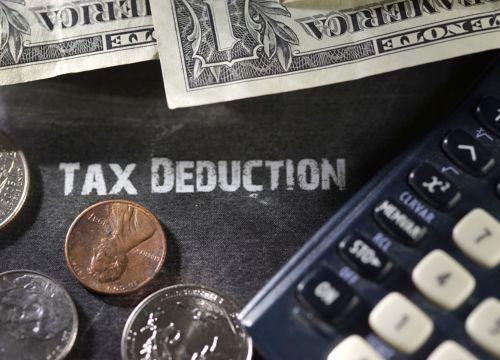» Taxation » 7 Work-Related Expenses To Claim To Maximize Your Tax Deductions
7 Work-Related Expenses To Claim To Maximize Your Tax Deductions
When it comes to tax time, everyone wants to make the most of their deductions to ensure they’re not paying more tax than necessary. One way to achieve this is by exploring those work-related expenses you might not have claimed before. These expenses, often overlooked, can significantly impact your tax return, so let’s dive into this often-underappreciated aspect of tax planning.

Unclaimed Work-Related Expenses
Unclaimed work-related expenses are those costs incurred as an employee that haven’t been used elsewhere in your tax return. These expenses span various categories, each presenting an opportunity to reduce your taxable income. Let’s explore some of these often-missed deductions:
#1. Union Fees and Professional Memberships
If you’re a member of a union or belong to a professional association related to your line of work, you may be eligible to claim the fees or subscriptions you pay as a tax deduction. These fees can include union dues, and membership fees for trade associations, business organizations, or professional societies.
#2. Overtime Meal Expenses
For those who occasionally find themselves working overtime, there’s good news. You can claim meal expenses related to genuine overtime work, provided certain conditions are met. To be eligible, you must have received a legitimate overtime meal allowance from your employer under industrial laws, awards, or agreements. Additionally, you need to ensure that you purchased and consumed a meal during your overtime.
It’s important to note that if your claim exceeds $33.25 per meal, you must have written evidence, such as receipts, to substantiate the cost of the meals. However, any amount for overtime meals included in your regular salary and wages, like payments under a workplace agreement, does not qualify as an overtime meal allowance.
#3. Professional Development Expenses
Investing in your professional growth often involves attending seminars, courses, conferences, and workshops. The expenses incurred for such events, including registration fees, travel costs, and accommodation, can be claimed as tax deductions. These opportunities not only enhance your skills but also offer potential tax benefits.
#4. Reference Materials and Subscriptions
Staying informed and updated in your field often requires reference books, technical journals, and trade magazines. The costs associated with acquiring these knowledge-enhancing materials can be claimed as work-related expenses. It’s essential to keep records of your purchases or subscriptions for documentation.
#5. Tools, Equipment, and Professional Libraries
If your work requires tools, equipment, or professional libraries, you may be eligible to claim deductions for their work-related use. Items costing $300 or less may qualify for an immediate deduction, while more expensive items can be claimed for the decline in their value over their effective life. It’s crucial to maintain records of the purchase, as well as their use for work.
#6. Computer-Related Expenses
For those using computers for work, you can claim expenses like interest on money borrowed to buy a computer, repair costs, and the decline in value of the computer. Internet access charges and phone calls can also be claimed if used for work purposes.
#7. Working from Home Deductions
With the rise of remote work, home office expenses have gained prominence. You have two methods to choose from for calculating these expenses:
- Revised Fixed Rate Method: Claim a rate of $0.67 per hour worked from home. This method covers additional running expenses like electricity, internet, phone, and stationery. It doesn’t include the decline in value of assets.
- Actual Cost Method: Claim the actual work-related portion of running expenses based on a reasonable calculation.
To optimize your deduction, choose the method that aligns best with your situation and meet the relevant criteria and record-keeping requirements.
In a nutshell, while these other work-related expenses might seem minor individually, collectively, they can make a substantial difference in your tax return. By being aware of these potential deductions and keeping thorough records, you can make the most of these opportunities to reduce your taxable income and maximize your tax refund. Remember, every eligible expense adds up, so ensure you claim what you’re entitled to within the bounds of tax regulations.
Documentation Requirements
Claiming work-related expenses without receipts is possible, but it’s crucial to have the right documentation to substantiate your claims. Here’s what you need to know:
1. Income Statements
Begin by gathering your income statements or PAYG (Pay As You Go) payment summaries. These documents provide an overview of your earnings and are essential for accurately reporting your income.
2. Bank Statements
Bank statements can serve as substitutes for receipts in some cases. These statements should clearly indicate the purchase amount and include a description of the expense. To strengthen your claim, consider providing photographs of the item packaging that confirm the purchase amount. Additionally, if you have multiple expenses within a single transaction, such as personal and work-related items, it’s advisable to differentiate them through annotations or photographs.
3. Income Statements for Recurring Deductions
Review your income statements for recurring deductions related to your work.
For example, if union fees are automatically deducted from your pay, they are often listed as a line item on your income statement. You can include these as deductions on your tax return to potentially increase your refund.
4. Online Records
If you’ve lost a receipt for a significant purchase, consider checking your email or online banking account.
Many retailers send electronic invoices that can be downloaded and used as proof of purchase.
Contact the retailer if necessary to obtain a duplicate receipt based on their records, especially for in-store purchases.
5. Logbooks for Vehicle Expenses
If you use your personal vehicle for work-related purposes and don’t have receipts for fuel or maintenance, you can still claim these expenses using a logbook. The ATO allows you to claim petrol costs at a nominal rate per kilometre. Two methods exist for calculating this deduction:
- The Logbook Method: This approach involves maintaining a detailed logbook of your kilometres travelled for work over at least 12 continuous weeks. Additionally, you need to record odometer readings and details of your car’s usage. You can claim expenses such as running costs and depreciation, which must align with the ATO’s depreciation rates. For fuel and oil expenses, you can use receipts or estimate costs based on odometer readings and your vehicle’s fuel consumption rate.
- The Cents Per Kilometer Method: Under this method, you calculate deductions based on the prescribed rate for the financial year. As of the 2023 financial year, the rate is 78 cents per kilometre. No receipts are required, but you need to provide written evidence of your work-related trips in the form of a journal. If the car is shared by joint owners claiming business use, both can claim up to 5,000 kilometres each.
6. Work Diaries
For those who work from home, maintaining a work diary is essential. The ATO now requires individuals to keep a daily record of their work hours rather than using a representative period. Valid records may include timesheets, rosters, or a daily diary. To claim deductions for expenses like electricity, gas, and internet, you’ll need to provide a monthly or quarterly bill in your name or evidence of shared expenses if the bill isn’t solely under your name. Receipts should also be kept for stationery and computer consumables.
7. Depreciating Assets Records
If you’re claiming deductions for depreciating assets, keep your records for at least five years after the last claim. If the receipt for the asset doesn’t specify its nature, you’ll need to provide that information before lodging your tax return. Additionally, maintain a four-week representative diary of the work-related use of the asset, showing both personal and income-generated use.
Ensuring you have the necessary documentation is critical when claiming deductions without receipts. While the ATO provides alternatives for substantiating your claims, maintaining accurate records and seeking professional advice can help navigate these rules effectively and maximize your potential tax deductions.
Maximum Claim Limits
While these deductions offer a fantastic opportunity to reduce your taxable income, it’s essential to be aware of any maximum claim limits.
For instance, meal expenses have a threshold of $33.25 per meal, and there’s a $300 limit for total work-related expenses without writing evidence.
Benefits and Limitations of Each Method
When it comes to working from home expenses, each method has its advantages and limitations.
The revised fixed rate method simplifies claiming but doesn’t cover the decline in the value of assets used for work.
On the other hand, the actual cost method requires more detailed record-keeping but provides a more accurate reflection of your expenses.
Exclusions: What You Can't Claim as Deductions
While there are numerous work-related expenses you can claim as deductions on your tax return, it’s equally crucial to be aware of what you cannot claim. The Australian Taxation Office (ATO) has clear guidelines on expenses that do not qualify for tax deductions. Understanding these exclusions is essential to avoid potential issues with your tax return.
Here’s a breakdown of what you can’t claim as deductions:
- Costs of Entertainment: Any expenses related to entertainment, such as meals, outings, or events primarily intended for leisure, cannot be claimed as tax deductions. This includes client entertainment and social gatherings, even if they involve discussions related to work.
- Private Expenses: Personal expenses unrelated to your work or business activities cannot be claimed. This category encompasses costs like childcare expenses, fees paid to social clubs, and general household items such as coffee, tea, and milk that your employer might typically provide at the workplace.
- Childcare and Education: Costs associated with children’s education, whether it involves setting up for online learning, homeschooling, or purchasing educational equipment, are generally not eligible for deductions.
- Employer-Provided Items: If your employer has provided you with items primarily intended for work, you generally cannot claim a deduction for these items. This includes assets like laptops, mobile phones, software, protective clothing, briefcases, and tools of the trade if your employer paid for them, or some of the costs were reimbursed by your employer, and the benefit was exempt from fringe benefits tax.
- Occupancy Expenses: Expenses related to the occupancy of your home, such as rent, mortgage interest, rates, and insurance, typically cannot be claimed as deductions. However, if you are eligible for the home office expense deduction, some portions of these expenses may qualify.
It’s vital to be cautious and honest when claiming deductions. Incorrectly claiming expenses that fall under these exclusions can lead to penalties and repayment obligations. Maintaining accurate records and seeking advice from a tax professional can help ensure you stay compliant with tax regulations while maximizing your eligible deductions.
By understanding both what you can and cannot claim, you can navigate your tax return confidently, making the most of available deductions while adhering to the ATO’s guidelines.
Tips for Maximizing Deductions
When it comes to claiming work-related expenses without receipts, there are several strategies you can employ to maximize your deductions legally and efficiently. Here are some valuable tips to help you make the most of your tax return:
1. Keep Meticulous Records
Even when you don’t have receipts, maintaining thorough records is crucial. Whether it’s a logbook for vehicle expenses, a work diary for home office costs, or a detailed spreadsheet of expenses, organized records will be your best friend during tax time. Record essential details like dates, descriptions, and amounts spent to substantiate your claims.
2. Use Technology to Your Advantage
In this digital age, there are numerous apps and software designed to help you track and manage expenses. Consider using expense-tracking apps that allow you to capture receipts through your smartphone’s camera and categorize expenses efficiently. These digital records can serve as acceptable substitutes for paper receipts.
3. Leverage the $300 Rule
The ATO permits individuals to claim work-related expenses of up to $300 without receipts. While this doesn’t mean you can claim $300 for each expense, it’s a handy rule to remember. Ensure you accurately record these expenses in your work diary or records to validate your claim in case of an audit.
4. Combine Deductions
If you have several small expenses, it might be more efficient to combine them rather than claiming each one individually. For instance, if you regularly purchase stationery, combine these costs into a single claim to save time and effort.
5. Seek Professional Advice
Navigating the intricacies of tax deductions can be challenging, especially when dealing with unclaimed expenses. Consulting a tax professional or accountant can be a smart investment. They can provide guidance on which expenses are eligible, how to substantiate claims, and how to maximize your deductions while remaining compliant with tax laws.
6. Learn About Available Deductions
Understanding the deductions you’re entitled to claim is vital. Familiarize yourself with the ATO’s guidelines for work-related expenses and eligible deductions. This knowledge will help you identify potential deductions and keep relevant records. Don’t forget to stay updated on any changes in tax laws or regulations.
7. Maintain a Separate Bank Account
Consider opening a separate bank account for business-related expenses, even if you’re an employee. This can help streamline the tracking of deductible expenses, making it easier to identify work-related transactions when tax time arrives.
8. Educate Yourself Continuously
Tax rules and regulations can change, and what you could claim without receipts today might differ from next year. Dedicate some time to stay informed about any updates or changes in tax laws. This proactive approach will help you adapt your record-keeping practices accordingly.
9. Use Online Resources
Take advantage of online tools and resources provided by the ATO. They offer detailed guides, calculators, and documentation templates that can simplify the process of claiming deductions without receipts. These resources can also help you better understand the requirements and substantiation methods for various expenses.
10. Plan Ahead
Lastly, consider planning your expenses strategically. If you anticipate significant work-related costs, make an effort to retain electronic records, emails, or digital invoices. These can serve as valuable backup documentation if you ever misplace a physical receipt.
By following these tips and staying organized throughout the year, you can confidently claim your work-related expenses without receipts, maximize your deductions, and ensure compliance with tax regulations. Remember, accurate record-keeping is the key to successfully navigating the world of unclaimed deductions.
Conclusion
Exploring other work-related expenses can significantly impact your tax return. By claiming what you’re entitled to, you can maximize your deductions and potentially receive a more substantial tax refund.
So, when preparing your tax return, don’t forget to explore these often-unclaimed deductions. It might just be the key to optimizing your tax situation.
Related Articles:





